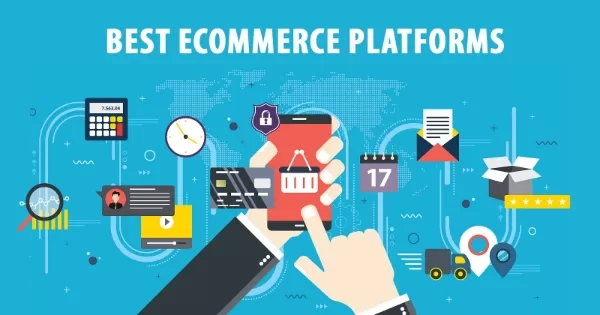Insights
What Are The Best Ecommerce Platforms For SEO?
On Digitals
22/08/2025
20
Starting an online store is exciting, but picking the right platform can be tricky. You want a site that not only looks great but also brings in new customers from search engines. This is where finding the best ecommerce platforms for SEO becomes a game changer for your business. The right platform can make it much easier to optimize your products and content, helping you rank higher and attract valuable organic traffic without the need for a huge advertising budget. Getting this decision right from the beginning sets a solid foundation for long-term growth and success.
Why Should You Care About the Best E-commerce Platforms for SEO?
What makes SEO essential for your e-commerce store?
Choosing the best ecommerce platforms for SEO isn’t just some fancy marketing preference but a game-changer for your online store’s future. Organic traffic is pure gold, and SEO proves to be the most effective method to go about it. According to WebFX, a leading digital marketing agency, 70% of search result clicks are for organic listings.
This kind of traffic is incredibly valuable because it comes from customers who are actively hunting for products or services like yours. When you rank well, you’re not just boosting your brand visibility but also building trust with potential shoppers. Over time, you’ll reduce your reliance on expensive paid ads, helping you lower your customer acquisition costs and improve your overall marketing ROI.

Why should you choose the best ecommerce platforms for your storefront?
What real business problems do platforms solve with SEO tools?
You’ve got an online business, but you’re dealing with broken links that lead nowhere, slow page load times that make visitors want to scream, and poor discoverability where your products are basically invisible even when they’re exactly what someone’s searching for. Those problems are extremely common, and they can have detrimental effects on your SEO performance.
The right e-commerce platform can be your hero here. These platforms come with built-in SEO tools designed to tackle these headaches head-on. They’ll help you automatically create clean URLs, compress product images to speed things up, and even suggest where to sprinkle in your main keywords for better optimization. These features make it way easier to keep your store healthy and visible, which is exactly what search engines love to see.
Which Platforms Shine as the Best E-commerce Platforms for SEO?
Shopify
Shopify is often everyone’s favorite for good reason. It’s easy to use, and it comes loaded with solid SEO tools right out of the box. The platform makes it super simple to customize things like your product page URLs to make them more descriptive and keyword-friendly. You can also edit meta titles and descriptions without breaking a sweat, which is what shows up in search results.
Plus, Shopify has a built-in blogging engine, which is huge for creating content that brings in new visitors. Its themes are generally mobile-optimized too, so that’s one less thing to worry about.
WooCommerce
WooCommerce is the go-to choice for anyone who wants total control. Since it’s built on WordPress, you get all the amazing flexibility and power of the world’s most popular content management system. This means you can get super specific with your URL slugs and even add breadcrumbs, which are fantastic for user navigation and SEO.
You also have tons of freedom to create rich content like detailed blog posts and guides that help you rank for a wider range of keywords. If you want control, this is your platform.

WooCommerce is among the best ecommerce platforms for SEO
BigCommerce
BigCommerce is another strong player in this game. It has incredible built-in features that are ready for SEO from day one. The platform automatically creates SEO-ready URLs and can handle things like rich snippets (those cool little bits of extra information that show up in search results, like product ratings and pricing).
BigCommerce also has powerful enterprise features that can handle multilingual and global selling, which is a huge advantage if you’re planning to expand your business worldwide.
Magento
For bigger businesses or those with specific needs, Magento (now known as Adobe Commerce) is a powerhouse option. It’s incredibly robust and scalable, giving you deep control over every part of your store. This level of customization is perfect for implementing advanced SEO strategies like structured data to help search engines understand your products better. While it has a steeper learning curve, its scalability makes it a solid choice for large businesses with big growth plans.
Wix
Wix has seriously upped its game and now has a pretty solid reputation for SEO. Its “SEO Wiz” is a fantastic tool that guides you through the process step by step, which is perfect if you’re new to all this SEO stuff. It’s an all-in-one platform with intuitive tools that make optimization simple, so you can focus on actually running your business. Wix gives you the basics you need without a lot of technical headaches.
Squarespace
Squarespace is known for its gorgeous, modern designs, but it also has a solid foundation for SEO. It’s super easy to use and provides built-in SEO basics that help your site get found. Its templates are already optimized for mobile and they include blogging functionality.
For small businesses and creatives who want a clean, professional look with simple, effective SEO tools, Squarespace is definitely worth considering.

Consider Squarespace as a viable ecommerce platform
What Criteria Define the Best E-commerce Platforms for SEO?
Which SEO features matter most when choosing a platform?
When you’re trying to pick a platform, you need to look beyond the shiny surface and dig into the core SEO features. The ability to control your URLs, meta titles, and descriptions is huge. This lets you make your pages more descriptive and keyword-friendly, which is how search engines figure out what your content is about.
Another crucial feature is automatic XML sitemap generation. Think of a sitemap as a roadmap of your website for search engines, helping them crawl your site more efficiently, so they can tell what you have going on and whether those pages of yours can rank on the SERPs.
You’ll also want to look for schema markup support. This is special code that helps search engines understand what your content means, which can lead to those rich results like star ratings and pricing in search results.
Finally, always check for built-in image optimization and mobile-friendliness, since Google prioritizes fast, mobile-ready sites as users are more inclined to browse on-the-go, especially if they’re shopping online.
Why do plugins and integrations boost a platform’s SEO potential?
While a platform’s built-in features are a great starting point, plugins and integrations can take your SEO game to the next level. They are basically specialized power tools that give you more control. For example, plugins like Yoast SEO on a WordPress site (with WooCommerce) or SEO Manager on Shopify can provide deeper analysis, suggest improvements, and help you manage how optimized your content is so you can make the right adjustments at the right time.
These tools make it easier to handle tasks that might otherwise require serious technical know-how. They can also help you connect with other important services, like Google Analytics, so you can track your SEO performance with way more detail.

What should you consider when choosing an ecommerce platform?
How do speed, site architecture, and structured data impact SEO?
Nobody likes a slow website, and Google has made it crystal clear that site speed, and the entire website performance, is a ranking factor. Platforms that are built for speed or have features like image compression and content delivery networks (CDNs) can give you a significant edge. Also, paying close attention to your Core Web Vitals like Largest Contentful Paint (LCP), Interaction to Next Paint (INP), and Cumulative Layout Shift (CLS) can help you see how well your website performance is.
A logical site architecture (how your pages are organized and linked) is also crucial. A clean, easy-to-navigate site helps both users and search engines find what they’re looking for. Structured data is a powerful tool for giving search engines more context about your products. According to Google for Developers, adding this markup can lead to more engaging search results, which can boost your click-through rate.
Should a blogging tool influence your choice of e-commerce platform for SEO?
The short answer is absolutely yes. A blogging tool is way more than just a place to write articles – it’s a powerful engine for content marketing. A blog helps you attract new visitors by ranking for informational keywords that people use when they’re not quite ready to buy yet.
For example, a store selling running shoes could write a blog post titled “Best Shoes for a Marathon,” which would attract people interested in marathons. This helps you build authority and trust, which can turn into sales down the road. A strong, built-in blogging tool makes this whole process much easier, allowing you to create and manage content without a lot of hassle.
What else to look for beyond SEO for long-term value?
While SEO features are important, you also need to think about the big picture and the long-term health of your business. The best platform for you should be easy to use day-to-day, so you can focus on selling instead of fighting with a complicated interface. The best ecommerce platforms for SEO should also have key functions like inventory management, order management, payment processing, etc.
Solid customer support is another must-have, especially when you’re just starting out or run into a technical hiccup. You also need to consider scalability. Can the platform grow with you? Will it handle a huge influx of traffic during a big sale?
Looking for these features can help you avoid the painful process of migrating to a new platform later on. That’s a headache you want to avoid.
Which Platform Should You Choose Based on Your Business Needs?
What platform fits best for running a small, content-driven store?
If your business relies heavily on content to bring in new customers, your best bet is to choose a platform that gives you serious control over your blog. WooCommerce is a fantastic option here because it’s built on WordPress, which is basically the gold standard for content management. You get tons of freedom to create rich, detailed content that can help you rank for all kinds of keywords.
If simplicity is more your thing, Shopify is a great alternative. While it doesn’t offer the same level of granular control, its built-in blogging engine is easy to use and totally capable of handling your content marketing needs.
What makes a platform SEO-wise scalable?
For a business that’s growing fast and maybe even selling globally, scalability is everything. In this case, BigCommerce is a top choice. It’s built to handle multi-channel and multi-language selling right from the start, which makes it way easier to expand your reach.
BigCommerce also has powerful native features for handling structured data and other complex SEO tasks, so you don’t have to rely on a bunch of different apps or custom code. It provides a solid, enterprise-level foundation that can support a growing product catalog and a global customer base without breaking a sweat.
What’s a top pick for large enterprises?
For a large business or a high-volume store, the choice is pretty clear: Magento. While it has the steepest learning curve and often requires an in-house developer, its power is unmatched. Magento offers a level of customization and flexibility that’s perfect for implementing the most advanced SEO strategies.
You have complete control over every single aspect of your site, from URL structures to rich snippets and beyond. This freedom allows you to build a site that’s perfectly optimized for your specific needs, which is exactly what a big business needs to stay competitive.

Choose the right ecommerce platform based on your business scale
FAQs About the Best E-commerce Platforms For SEO
Which e-commerce platform is most flexible for SEO?
WooCommerce, built on WordPress, is considered the most flexible platform because of the extensive control it gives you over your site’s content and technical elements. However, BigCommerce is a close second, offering powerful built-in tools for things like structured data and site architecture that provide plenty of freedom for more advanced strategies.
Do I need advanced technical skills to use the best ecommerce platforms for SEO?
It really depends on which platform you choose. Hosted platforms like Shopify and Wix are perfect for non-technical users because they handle many of the technical aspects for you. However, platforms like WooCommerce and Magento require more technical knowledge to set up and maintain, but they also offer way more control for advanced SEO customization.
Can blogging improve my SEO when using an e-commerce platform?
Yes, absolutely. A blog is a fantastic way to attract new visitors by creating content that answers common questions and ranks for informational keywords. Platforms like Shopify and WordPress with WooCommerce have native blogging engines that make it easy to create content that can bring in new organic traffic and build authority in your niche.
Is Shopify’s URL structure a limitation for SEO?
Shopify’s URL structure can sometimes be a limitation because it has a predefined format that you can’t fully customize. For example, product URLs always include ‘/products/’ and collection URLs always include ‘/collections/’. This can make it tough to create a completely clean URL structure, but for most businesses, it’s not a major issue since you can still optimize the URL slug.
How can I prepare SEO data like product details for better Google visibility?
To prepare your product data for better Google visibility, you should use structured data, which is special code that helps search engines understand what your content means. You should also make sure your product pages have unique, detailed descriptions, high-quality images, and a clean URL structure. Submitting an XML sitemap is also key, as it helps search engines crawl and index your products more efficiently.
What’s the easiest way to switch e-commerce platforms without losing SEO traction?
The easiest way to switch platforms is to create a detailed game plan. You should prioritize keeping your existing URL structures as much as possible. For any URLs that change, you absolutely must set up 301 redirects from the old URLs to the new ones. It’s also crucial to perform a content audit to make sure all of your high-ranking pages are moved over to the new site, so you don’t lose any valuable content.
Finding the best ecommerce platforms for SEO is all about making a smart choice for your business’s future. By prioritizing features like crawlability, site speed, and structured data, you can set your store up for long-term organic success. The right platform not only makes your life easier but also serves as the foundation for attracting high-value traffic, building trust with customers, and reducing your reliance on paid advertising.
Now that you know how vital SEO is, you might be thinking about the best way to move forward. The process can seem pretty complicated, but you don’t have to tackle it alone. The SEO service from On Digitals can help. Our team of experts, based in Vietnam, offers customized strategies designed to improve your website’s organic rankings and attract more customers.
Read more
